Professor Sung-Yueh Peng (彭松嶽) will discuss digital governance initiatives against the Coronavirus (COVID-19) pandemic.
Professor Tze-Tien Hsu will talk about allocating health care resources in deficiency during the COVID-19.
Professor Chun-Ying Wu (吳俊穎, Associate Dean, College of Medicine, National Yang Ming Chiao Tung University) will provide an analysis of Coronavirus-related global data about mortality rate. Topics will include numbers of detection, vaccination rate, and lockdown index.
Professor Tsung-Ling Lee (李崇菱) will discuss technocracy and multiple publics in response to the COVID-19 pandemic.
Prof. Shao-Man Lee (李韶曼), Prof. Jiun-Yi Tsai (蔡君宜) and Prof. Chih-Ming Liang (梁志鳴) will talk about risk communication during COVID-19 pandemic. Topics will focus on COVID-19 press conferences in Taiwan, including subject models and content analysis.
This Student-Faculty Forum will focus discussion on campus democracy in the face of Coronavirus (COVID-19) pandemic.
Mark will discuss designing and implementing an effective learning environment. Topics will include technology necessary (cameras, microphones), online learning tools (Canvas, Moodle), and other tools of the trade.
Jimmy Chia-Shin Hsu will discuss resistance and disobedience under democracy and rule of law. Topics will focus on a reflection of a criminal judgment of Supreme Court from a legal philosophy perspective.
Professor Jen-Shou Hsu (許仁碩) from Hokkaido University Graduate School of Law, will give a talk on the topic "Construct an Effective Police Supervisory System: Comparison among Taiwan, Hong Kong, and Japan."
Jakob Huang (黃朝琮律師) from Chen & Lin Attorneys-at-Law will discuss the topic "Provisional Injunction in Commercial Cases and Constructing Directors’ Liability Law."
Speaker: Hiroko Ito (Academic Research Fellow, Graduate School of Law, Nagoya University, Japan)
Moderator: Thomas Chen (Director, NYCU School of Law)
Panelist: Robert Leflar (Visiting Professor, NYCU School of Law)

In this lecture, we will discuss the role that companies are expected to play in the governance of Artificial Intelligence under the proposed EU AI Regulation. This Regulation, if passed, will be the first significant binding legal instrument regulating the development and use of artificial intelligence in the world, and will shape the development of the governance of AI not only in the European Union but across the globe.
The proposed Regulation will impose a wide range of obligations on providers of AI systems to ensure that the systems they place on the market are safe and respect the fundamental rights of persons. These providers will mostly be business companies, in both Europe and elsewhere. This lecture will explain the proposed Regulation and examine in particular the obligations, which the Regulation would impose on such companies engaged in the development and deployment of AI.

※This event will be in English
Speaker: Dr. Jevgenija Vienažindytė, Attorney at law, Lecturer at Vilnius University Faculty of Law
Topic: The European Union Falsified Medicines Directive (2011/62/EU): General framework
Speaker: Koray Parmaksiz, Researcher, Erasmus School of Health Policy & Management (ESHPM), Erasmus University Rotterdam, The Netherlands
Topic: What Makes a National Pharmaceutical Track and Trace System Succeed? Lessons From Turkey

※This event will be in English
Speaker: Anna Bryła, Poland
Topic: Impact of ESG regulations on business in the EU
Speaker: Adam Kościelniak, Poland
Topic: Renewable energy landscape in Europe
This event will be in English.
Hiroshi MIYASHITA is Professor at Chuo University. Prior to this, he was chief in the Office of Personal Information Protection in the Cabinet Office, and assisted Taiwan's government in drafting the Personal Data Protection Act. His research areas include constitution law, information privacy, Common Law, GDPR, etc. In this lecture, we will discuss the latest Personal Data Protection Act and restrictions on data transfer in Japan under the GDPR adequacy decision.
Naoko AKIMOTO was assistant professor of NYCU School of Law, and worked in the predecessor of Anderson Mori & Tomotsune Law Firm, a large law firm in Japan. She served as Manager of the Department of Research Integrity and Legal Affairs, Japan Agency for Medical Research and Development (AMED). Her research areas include medical law, pharmaceutical law, information privacy .

This event will be in English
Lecture: EU Digital Law and Synthetic Data.
About: The goal of this lecture is threefold:
1) to give a short introduction to EU digital law,
2) to explain how synthetic data (that is, fake data generated by machine learning methods that mimic the statistical properties of an original/real dataset) hold the promise to circumvent data protection and copyright limitations, and
(3) to show how thinking about these uses of synthetic data can illustrate certain tensions within the EU Digital Strategy.
The lecture partially builds on:
Katja de Vries (2022) ‘A Researcher’s Guide for Using Personal Data and Non-Personal Data Surrogates: Synthetic Data and Data of Deceased People’ in: ‘Law, AI and Digitalisation’ (Eds. Katja De Vries, Mattias Dahlberg), Iustus, Uppsala.
In this chapter Katja de Vries examines synthetic data as a ‘possible surrogate for personal data, which allow researchers to escape from the scope of the GDPR.’
Home » About NYCU Law – News & Events
Congratulations to our master's student Zhu Xi-lin and graduate students Lee Szu-Yi and Hsiao Yi-Chan for passing the New York State Bar Exam!
Home » About NYCU Law – News & Events
Dean Chen has been invited by the Financial Supervisory Commission (FSC) to serve as the scholar representative for the regular "Financial Action Innovation Regulation Adaptation Platform" working group. The group focuses on reviewing regulations related to financial policy, risk management, technological innovation, financial security, and regulatory easing. By facilitating proactive problem identification and discussions between academia and industry, the working group aims to propose recommendations for the FSC to promote fintech innovation.
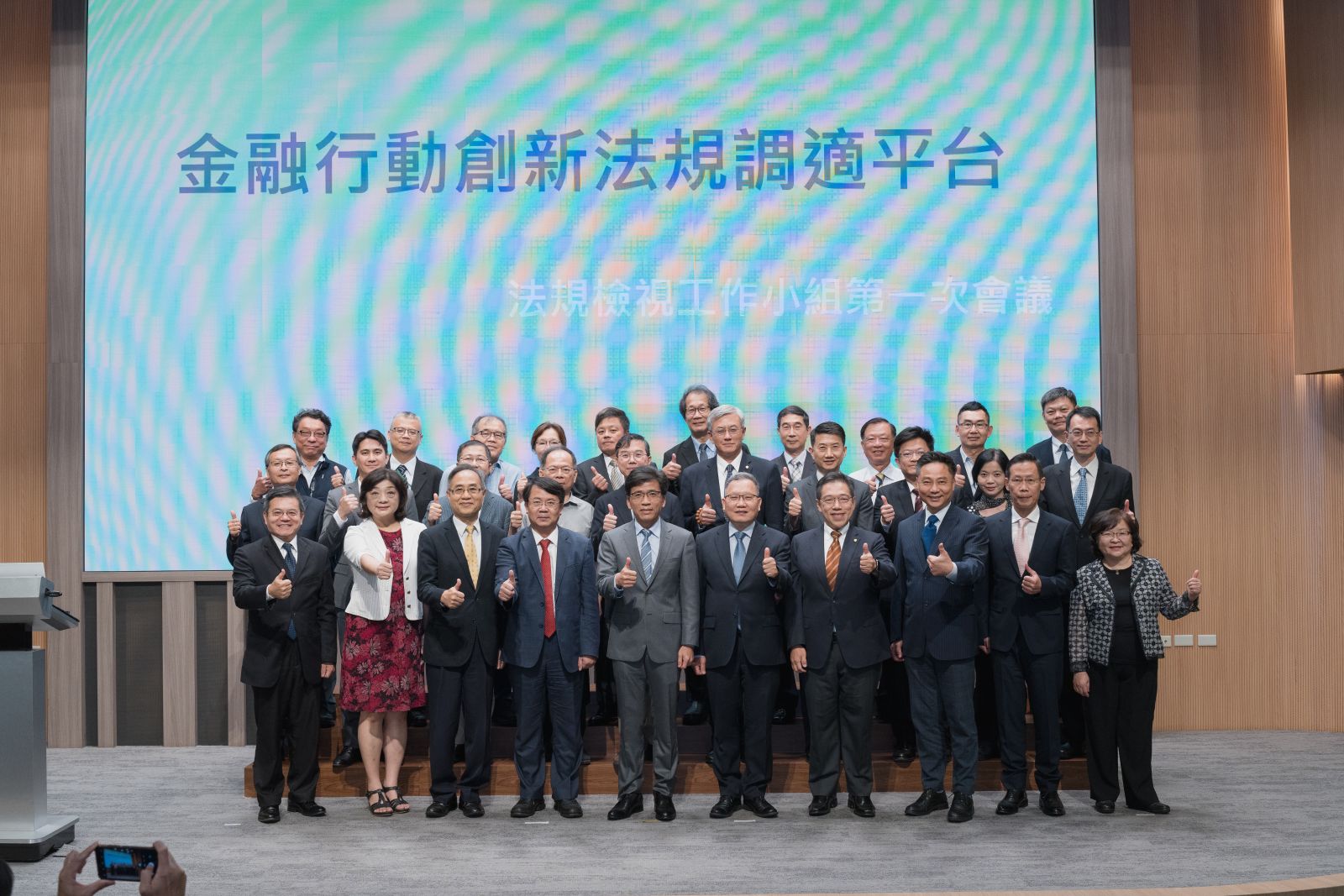
Home » About NYCU Law – News & Events
Dean Chen attended the Supreme Prosecutors Office Legal Forum, where he expressed his views on the positioning and scope of the right to defense during the investigation stage. His talk was titled "Non-Disclosure of Investigations, Substantive Effective Defense, and Lawyer Self-Regulation Norms."
Home » About NYCU Law – News & Events
Professor Simon Sun will be teaching International Cyber Law, Artificial Intelligence and Law, and Civil Procedure Law in the second semester of the 113th academic year. All students are welcome to enroll!
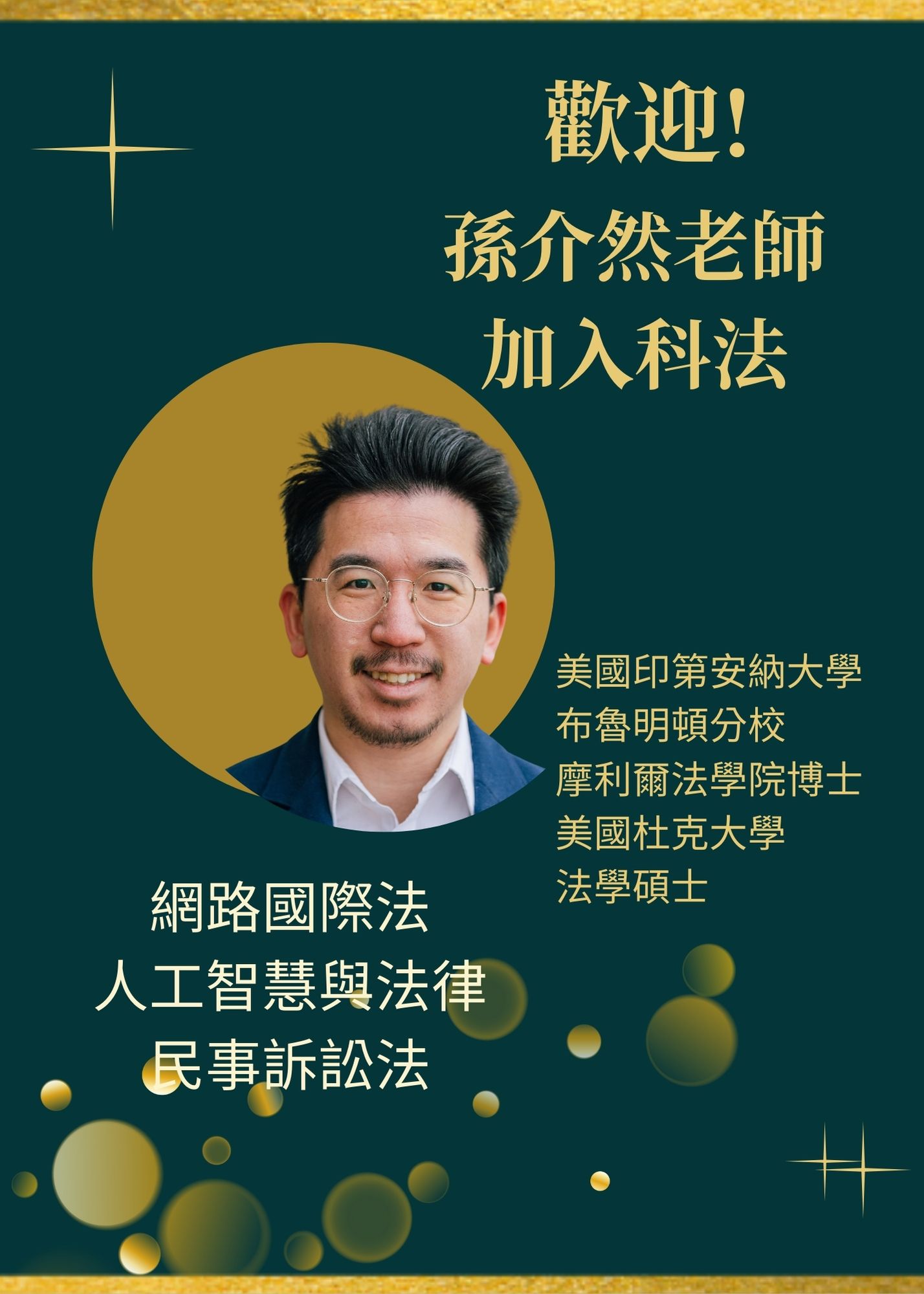
Home » About NYCU Law – News & Events
Call for Papers: NYCU Law annual Conference on Law and Technology in Taipei
The 28th National Technology Law Conference is scheduled for 21-22 November 2024, and we cordially invite you to attend. The conference will focus on five main themes: National Security and ICT Regulation, Digital Governance and International Trade, Intellectual Property Strategy and Technology Control, International Supply Chain and Labor Rights, Digital Health and Global Health Security. We welcome submissions related to these themes from academics, legal professionals, and industry experts to share their latest research and insights in the field of technology law.
For detailed information on submission themes, please refer to the attached document.
Submission Guidelines
Abstract Submission:
• Submissions can be in Chinese or English, between 1,000 to 2,000 words, and should include the research area, objectives, methods, key findings, and contributions.
• Online submission URL: http://review.law.nycu.edu.tw/
• Abstract submission deadline: 15 July 2024.
• Abstract review results:If the research aligns with the conference themes, notification will be sent via email approximately one month later.
Full Paper Submission:
• Authors whose abstracts are accepted should follow the instructions provided in the acceptance notification.
• Full papers should be limited to 20,000 words (excluding footnotes and appendices).
• Full paper submission deadline: 15 September 2024.
• Full paper review results will be notified by 15 October 2024 via email.
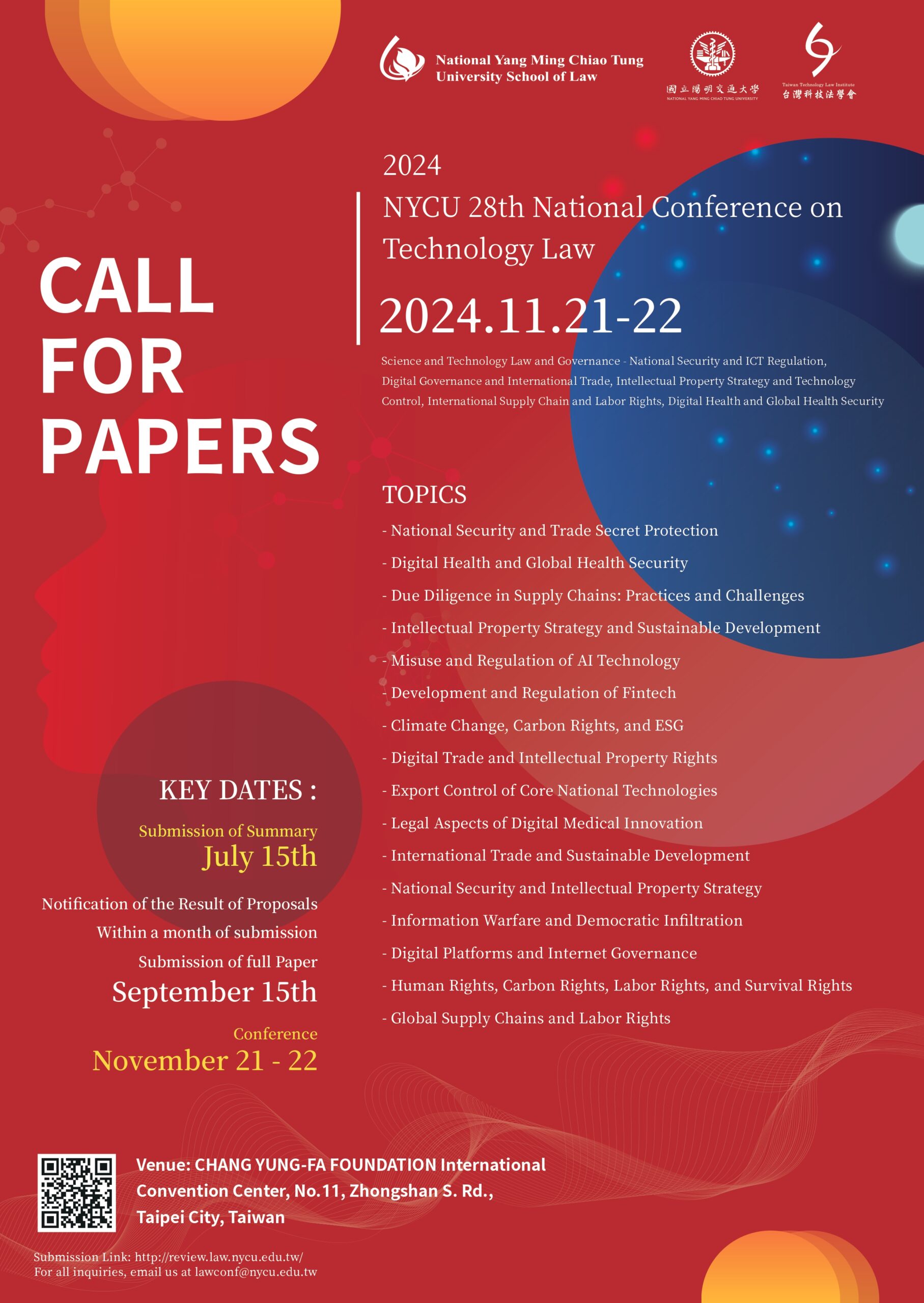
Home » About NYCU Law – News & Events
On 31 May 2024, the ALSA Criminal Law Chapter held its inaugural in-person meeting in Bangkok, Thailand. The story can be found here:https://www.alsa.asia/news-and-events/alsa-criminal-law-chapters-inaugural-meeting/
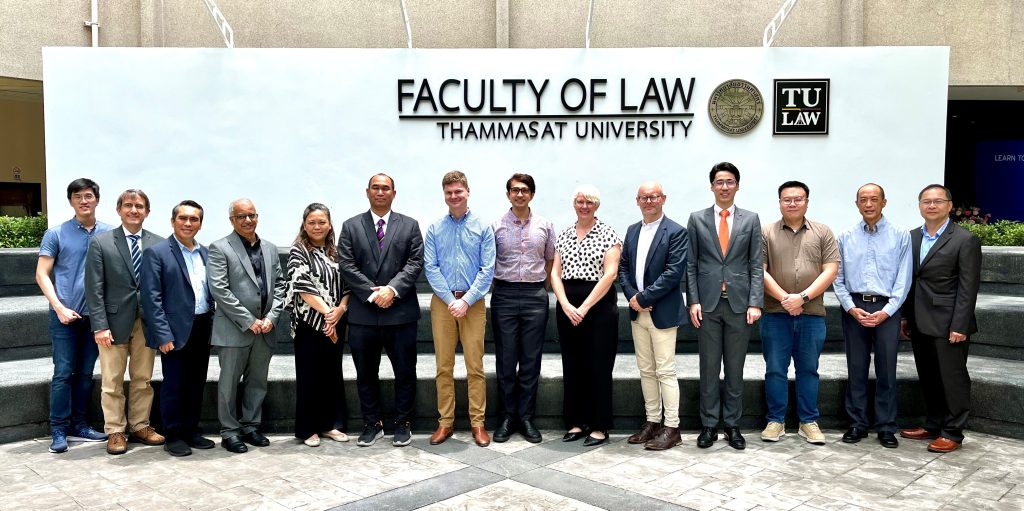
Home » About NYCU Law – News & Events
The first issue of the 2022-2023 Annual Report has been released! You are cordially invited to explore NYCU Law's development and activities through the Annual Report.
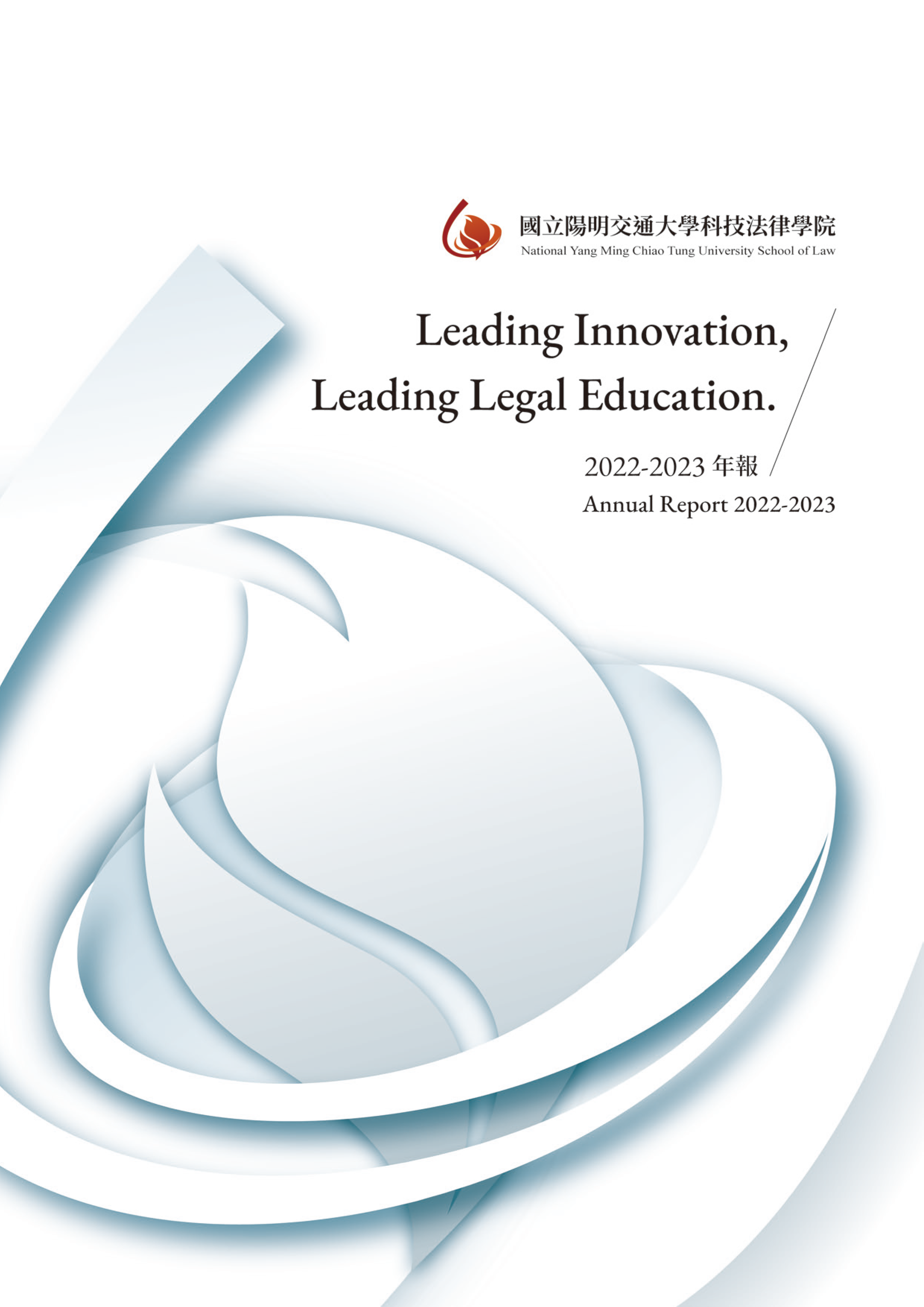
Home » About NYCU Law – News & Events
Congratulations to Chen Yu-Wei on receiving this honor!
Home » About NYCU Law – News & Events
Professor Lin Chih-Chieh contributes to the Hualien earthquake disaster area by ordering one hundred breakfast wraps to be sent to police stations, fire departments, and search and rescue teams, hoping for the smooth progress of all rescue operations and expressing gratitude to the police, firefighters, rescue team members, medical personnel, volunteers, and caring citizens.
Home » About NYCU Law – News & Events
The NYCU School of Law held the "International Symposium on Labor Dispute Mediation Systems" at the Academy for the Judiciary on March 15, 2024, inviting labor law experts and scholars from Taiwan, Germany, and Japan to engage in dialogue and exchange opinions on key issues related to labor mediation in Taiwan.
Full article report link: [link]
Home » About NYCU Law – News & Events
Dean Chen and Professor Chih-Chieh Lin have been invited to participate in the Judiciary and Organic Laws and Statutes Committee of the Legislative Yuan. Regarding the public hearings on the organization law of the Personal Information Regulatory Authority, the following legislative recommendations are proposed:
Firstly, considering that multinational corporations and foreign technology companies may possess personal data, how should the jurisdiction of this committee be implemented? There is concern that domestic small and medium-sized enterprises may end up being subjected to the strictest regulations. A tiered approach should be implemented.
Secondly, many companies may operate under licenses, and future inspections and penalties will involve various competitive and cooperative interactions. For instance, concerning patient data and financial consumer data, our requirements are stringent; therefore, how should those penalized seek recourse? Clarity must be established during legislative amendments.
Thirdly, besides ensuring consistency in terminology between the organizational law and the parent law, flexibility for timely updates should be retained to avoid constant legislative revisions. However, there must also be a requirement for clarity.
Fourthly, if personal data is unlawfully collected or misused, should the committee provide alternative remedies besides litigation? Should this mechanism be established within the committee or handled through an intermediary institution?
Finally, if data and information generation serve a public interest, such as personal health insurance data, consideration should be given to the density, manner, and openness of usage. While safeguarding personal data, the importance of utilizing data in the context of technological advancement must also be acknowledged.
Home » About NYCU Law – News & Events
The policy brief, “Operationalising Corporate Responsibility to Respect Human Rights in Taiwan: Current State and Challenges,” assesses the current state of implementation among a group of Taiwanese businesses. The Brief found early encouraging results and is a first step to evaluate how corporate responsibility to respect human rights is applied in Taiwan.
The research, authored by Wen-chi Chang and Dr. Bonny Ling, is the first study by the Taiwan Project for Business and Human Rights, a special collaboration between Work Better Innovations and Professor Yu-Fan Chiu, from the National Yang Ming Chiao Tung University School of Law.
Details:https://www.wbi.org.uk/publications/policybrief-1-2024/

Home » About NYCU Law – News & Events
Former Justice Tsai Ming-Cheng, an expert in intellectual property law, civil law, media law, and technology law, has made significant contributions in academia, earning high regard from both the academic community and governmental bodies. With over thirty years of research and teaching experience in areas such as intellectual property and media law, his outstanding academic achievements and extensive practical expertise will open new perspectives for students in the field of technology law. He is poised to lead NYCU to achieve excellence in academic research, legal education, and social service.
Home » About NYCU Law – News & Events
Congratulations to NYCU Law student Jing-Jie Chen on being awarded a scholarship by the Ministry of Education for overseas study. His research area is in Geriatric Medicine and Long-Term Care.
Home » About NYCU Law – News & Events
Shan-Pei Su, recent graduate at NYCU Law, presented research on Green Jobs and the Role of Labor Unions in Taiwan's Just Transition at the 2023 Asian Law Schools Association Annual Conference held at Sunway University, Malaysia.
Home » About NYCU Law – News & Events
Professor Mong-hwa Chin has served at the NYCU School of Law for eight years, and his outstanding academic achievements have been recognized, leading to his promotion to the rank of professor. Professor Chin has demonstrated excellence in his field, and this promotion reflects his talent in both academic research and teaching, as well as his outstanding performance in the academic community. Congratulations to Professor Chin on his well-deserved promotion to the position of professor, and we look forward to witnessing even greater achievements in his future career.
Home » About NYCU Law – News & Events
The thesis by graduate Yun-Ru Chen, titled "A Study on Patent Prosecution of AI-related Inventions: Focusing on the Issues of Disclosure Requirements," supervised by Professor Chih-Hsiung Chen & Feng-Chi Chen, won the "2023 Intellectual Property Rights Dissertation Scholarship" of the Asia Pacific Intellectual Property Association.
Home » About NYCU Law – News & Events
The graduate thesis by Wen-Chi Chang, NYCU School of Law alumni, titled "A Study on Legislation of Mandatory Human Rights Due Diligence Prohibiting Forced Labor: Focusing on EU Proposal for a Directive on Corporate Sustainability Due Diligence,” supervised by Associate Professor Yu-fan Chiu and Bonny Ling, won the 2023 International Law Thesis Award.
| 星期一 | 星期二 | 星期三 | 星期四 | 星期五 | 星期六 | 星期日 |
|---|---|---|---|---|---|---|
|
26
|
27
|
28
|
29
|
30
|
31
|
1
|
|
2
|
3
|
4
|
5
|
6
|
7
|
8
|
|
9
|
10
|
11
|
12
|
13
|
14
|
15
|
|
16
|
17
|
18
|
19
|
20
|
21
|
22
|
|
23
|
24
|
25
|
26
|
27
|
28
|
1
|
This website uses cookies to ensure you get the best experience on our website. Continued use of our website constitutes consent to their use.